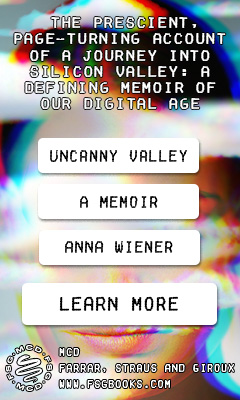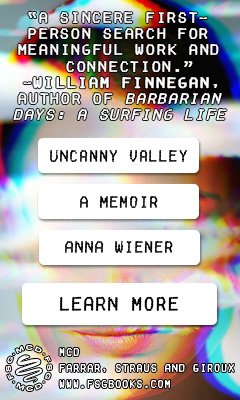Uncanny Valley: A Memoir
by Anna Wiener
Be "Down for the Cause. DFTC." This was the mandate to employees at the startup Anna Wiener joined in 2013. What was "the cause," exactly? Money is an obvious part of the answer; the company made money, and helped its clients make money. The product, though, was essentially surveillance--making "the cause" a little more complicated. This kind of progress and success for their own sake, and the tensions that arise from the ethically ambiguous growth in tech, form the core of Wiener's unforgettable debut memoir, Uncanny Valley, a portrait of her arrival, immersion and ultimate disillusionment in Silicon Valley.
Uncanny Valley begins with Wiener treading water in a mostly thankless job in New York City as an assistant in book publishing. Though the position affords her proximity to literature and art, Wiener founders as she seeks meaning in an environment that feels like it actually holds very little of it. The work is financially unsustainable, and Wiener craves change. Her transition to the tech industry is fairly natural: she joins a startup, three men developing an e-reader app. Her role was at times secretarial, at times creative and at times rewarding. At other times, it was clear the fit wasn't right. Still, the experience led her to seek further opportunities across the country, in tech mecca.
"When I arrived... in San Francisco, with a fresh haircut and two fraying duffel bags, I felt intrepid and pioneering," writes Wiener. "I did not know that thousands of people had already headed west for a crack at the new American dream, that they had been doing so for years. I was, by many standards, late." Late is relative, of course. Wiener arrives in time to work at numerous startups that have since become enormously successful, and in time to still see firsthand the effects of the tech boom on the Bay Area writ large.
Her first position is in customer support. As she gains proficiency--and maybe more importantly, confidence--she thrives. But as she embeds more deeply into the startup scene and its tech-fetishizing culture, an unsettling feeling grows as well. Unfettered, underregulated progress and belief systems that prioritize development and momentum above all else led to credos like "Move fast and break things" and, of course, the classic "Ask forgiveness, not permission."
Wiener recounts glamorous parties, boring meetings, gross wealth, imposter syndrome. The camaraderie of the tech workers is warm at times, a bath of pleasure-seeking alongside progress-seeking. But the pace is breakneck. Breakneck, as well, are her efforts to find a place to belong in San Francisco as the city changes. Wiener worries about the repercussions of the tsunami of development, both on the people of the city and the culture at large: "The city, trapped in nostalgia for its own mythology, stuck in a hallucination of a halcyon past, had not quite caught up to the newfound momentum of tech's dark triad: capital, power, and a bland, overcorrected, heterosexual masculinity."
These issues are uncomfortable truths in Uncanny Valley. "Sexism, misogyny, and objectification did not define the workplace--but they were everywhere. Like wallpaper, like air," writes Wiener. Issues involving trust, surveillance and Big Data add further complication. Yet Wiener mines sharp humor from all of these tensions.
"Like a woman who is constantly PMSing, a twenty-three-year-old founder of a crowd funding platform wrote about the climate," she recalls. "The extension of casual misogyny to weather was creative, but the digital ambassadors didn't seem to like actual women, either: they whined that the women in San Francisco were fives, not tens, and whined that there weren't enough of them."
But though she can joke about it, Wiener could not--and has not--stayed quiet about it: "I was the feminist killjoy. I did not pick my battles. I died on every available hill." As she fought for a better workplace, and a better culture, she also shifted industries again--to her growing writing career and increasing political advocacy. Throughout, she acknowledges the privileges she holds and the struggles of those who lack the same opportunities and access.
So Uncanny Valley is a story about work, but it's also a story of capitalism and complicity. It's a story of progress, greed, principles, EDM and a lot of kombucha. It's alternately outrageous and outraging. What makes Uncanny Valley unforgettable is not just Wiener's unique take on tech, but the fun of being along on the journey with her. Her immense intelligence and facility with language make the pages fly. She's generous, quippy, introspective and always self-deprecating. Technophobes have nothing to fear; she employs jargon mainly for laughs.
Despite these strengths, it is clear Wiener was undervalued--financially, certainly--in the tech industry. Wiener still almost seems skeptical that her skills hold value. They do, of course, but her meditations on how monetary, cultural and intrinsic value rarely overlap help explicate what "value" is, and how often that may be conflated with "power." The CEO of a company Wiener worked for once wrote about her, not realizing she would see it, "She's too interested in learning, not doing." Yet the cost of what happens when progress is made for progress's sake is one Wiener asks readers, urgently, to consider. Perhaps getting away from the kind of thinking that separates learning from doing is a first step. --Katie Weed







